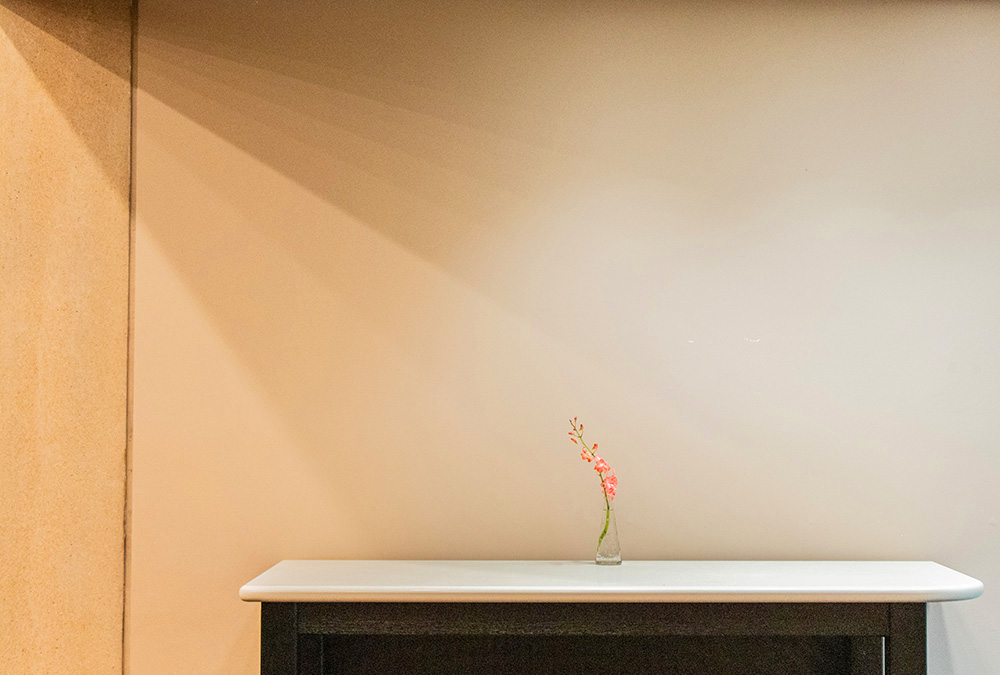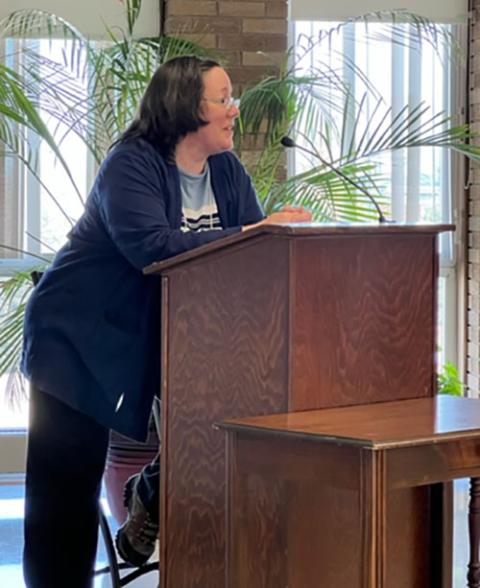
(Unsplash/Mitchell Luo)
That Lent falls during the spring is no coincidence.
This phrase leads off the description of a mini-retreat I gave in the days following Ash Wednesday called "Simplify Your (Spiritual) Life."
It might prove a bone of contention for some — the scheduling of this sacred season — with the Pagan observance of Ostara or Eostar celebrating the spring equinox.
For my purposes, though, the coincidence occurs with the practice of spring cleaning.

Julie Ferraro gives a retreat at Sophia Spirituality Center in Atchison, Kansas, March 4. (Suzanne Fitzmaurice)
In those climes with harsh winters, spring brings the chance to throw open the windows and let in much needed fresh air. Closets are relieved of clothes designed to provide warmth, in favor of lighter-weight attire. Bags and boxes are filled with items no longer needed — to be sent to a thrift store or set out for a Saturday morning garage sale.
The same need exists for the soul.
Each Lent brings with it an opportunity to reassess our faith. The challenges of the prior months — especially after so many months when, almost from day to day, it was impossible to tell if masks would be required, hospitals would be overrun with those suffering from COVID-19 variants, churches would be open or travel permitted — need to be reviewed, the impact measured and integrated.
Old concepts may need to be discarded, in light of the turmoil faced. The question asked of God since the first mention of COVID-19 on the news — "Why?" — still may have no answer. How can faith continue to grow and flourish when, at almost every turn, the future seems so uncertain?
Above and beyond COVID-19, family, work and other considerations can shake faith to the core. Lent is the perfect time to let in some fresh air, blow away the spiritual cobwebs of inaction and laxity, and renew the soul.
As with a physical spring cleaning, necessitating the need to get rid of excess "stuff," the soul also must be freed of ideas that weigh down faith.
I like to quote the late comedian George Carlin, whose stand-up routine about "stuff" still makes me laugh at its innate truth. A house, he explains, is just a place for us to keep our stuff. As we get more stuff, we need to buy a bigger house, so we have a place to put our stuff.
On a physical level, moving to a larger house is feasible (though cluttering it with a lot of stuff not advisable). For the soul, the more practical option is to spend Lent in quiet, listening to that gentle voice that reaffirms what we believe, so we can move past outmoded ideas and unclutter our faith.
Advertisement
This is where my beef with some theologians enters the picture. Through my years as a journalist, I've known or interviewed quite a few: Benedictine, Franciscan, Dominican, secular. The need to pick apart the concept of God, and try to explain it using "50-cent words" that ordinary folk need a dictionary to understand, is — in my estimation — rather pointless.
That kind of theology gives in to a very human weakness: the need to control knowledge and explain everything, from the first shaft of light and the "Big Bang theory" to what happens after death.
Fact is: Each human being is on this earth for a limited amount of time. The goal for each life is to use our gifts and do the best we can to share God's love with one another.
All the rest is like trunks of old clothes discovered in the attic: nice to look at, but basically useless.
Theology on a grand scale attempts to "humanize" God, to create a relatable being with qualities similar to our own, but superior, infinite.
The very idea of God belies such a viewpoint. It is so difficult for a human brain, for instance, to wrap itself around the notion that, for God, all time is but a moment. Authors, filmmakers and other creative sorts have tried to imagine such a scenario — often uplifting, humorous or dramatic — but, essentially, impossible to conceive.
That's why, as we try to simplify our spiritual lives this Lent, we should let go of heavy theological ideology and focus on the divine love that permeates all creation, allowing the soul to reflect that love, both in how we treat this planet on which we reside — speaking out in objection to the violation of natural resources — and how we interact with other human beings.
We can look past the nitpicking details and be vessels of compassion, caring and generosity, regardless of who we meet, where we are, or what we're doing.
Unfettered from complex aspects of theology, the soul will be free to soar, free to listen, free to love — the simplest, and most meaningful, expression of faith that will shine like a beacon for others to take to heart and bolster their own faith journey.







